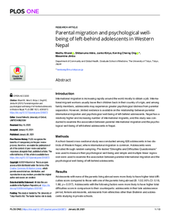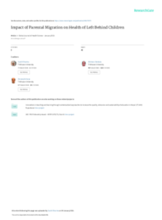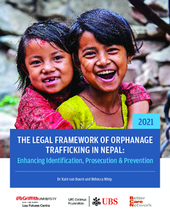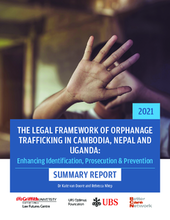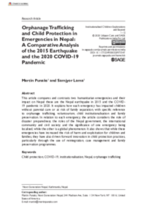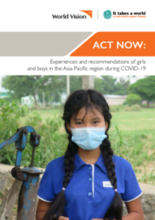This country page features an interactive, icon-based data dashboard providing a national-level overview of the status of children’s care and care reform efforts (a “Country Care Snapshot”), along with a list of resources and organizations in the country.
demographic_data
childrens_living_arrangement
children_living_without_bio
adoption
social_work_force
key_stakeholders
Key Stakeholders
Add New DataOther Relevant Reforms
Add New Datadrivers_of_institutionalisation
Drivers of Institutionaliziation
Add New Datakey_research_and_information
Key Data Sources
Add New DataAct Relating to Children 2018 - Nepal
Trafficking in Persons Report June 2018
Country Care Review: Nepal
Acknowledgements
Data for this country care snapshot was contributed by Forget Me Not and UNICEF Nepal.
Displaying 21 - 30 of 140
A school-based cross-sectional study was conducted among 626 adolescents in two districts of Western Nepal to examine the association between parental international migration and the psychological well-being of left-behind adolescents.
This study explores the physical and emotional effects of parental migration on left-behind children in Nepal.
This study examines Nepal’s compliance with international legal obligations, its child protection and anti-trafficking laws, and its criminal and procedural laws that regulate illegal transfer and trafficking of children. The study also raises issues regarding victim identification, inspection of child care homes and complaint mechanisms.
This study assesses and maps the legal, policy and procedural frameworks in both domestic and international law across Nepal, Uganda and Cambodia, where orphanage trafficking continues to undermine domestic efforts to stem the overuse of institutionalisation of children.
This article compares and contrasts two humanitarian emergencies and their impact on Nepal: these are the Nepal earthquake in 2015 and the COVID-19 pandemic in 2020.
This article draws on original empirical data to explore the narratives of young Nepali adults who lived in Kathmandu orphanages as children. Through these narratives, the article explores the diverse complexities of the residents' experiences of volunteer tourism and NGO ‘rescue’, and the shortcomings of recent ‘neoabolitionist’ frameworks.
These Practitioner Guidance Papers share the approaches of five Family for Every Child members in adapting existing helplines or setting up new ones during the COVID-19 pandemic
This consultation explores children and young people’s views and experiences related to COVID-19 and its secondary impacts.
In this podcast episode, Pramila Manandhar, media officer for CWIN in Nepal, shares her experiences in supporting children living and working on the street during lockdown.
In this podcast episode, Sumnima Tuladhar, a founding member and executive director of CWIN child helpline in Nepal, discusses how calls to the helpline changed when the COVID-19 pandemic reached Nepal. They discuss the processes drawn up to allow the helpline team to continue supporting children in dangerous situations.

